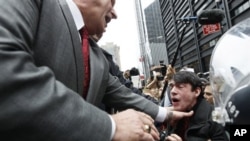| The Occupy Wall Street protest began in New York in September as a loosely organized movement against corporate greed, economic inequality and high unemployment. The protest movement quickly gained momentum and spread to other cities throughout the United States and in other countries as well. Here is a look at just a few of the many sites that have sprung up in the U.S.: DENVER, COLORADO Police estimate that the protest has cost the city more than $360,000 for the first half of October, to fund police and other personnel to deal with the protesters and ensure public safety and health. Police say they have arrested more than 80 people since mid-October. HONOLULU, HAWAII Demonstrators have been camped out in the Pacific island state and protested the recent APEC summit. During a dinner for world leaders such as President Barack Obama and Chinese President Hu Jintao, Hawaiian musician Makana said he performed a ballad that included lyrics such as "The time has come for us to voice our rage,” and “We are the many, you are the few.” He wore a jacket over a shirt that said "Occupy With Aloha." LOS ANGELES & OAKLAND, CALIFORNIA Hundreds of protesters are camped outside Los Angeles City Hall, complaining that the top 1 percent of the population is getting the income gains and the other 99 percent has been left out. In the city of Oakland, police on Monday cleared out demonstrators who had set up camp at the City Hall plaza, and arrested more than 30 people. Mayor Jean Quan issued a statement saying the effort took place "smoothly and peacefully." She said that there was repeated violence, as well as a murder, at the encampment. Quan said the encampment has been a tremendous drain on the city. Earlier in the month, police used tear gas when a number of protesters temporarily shut down the Port of Oakland, one of the busiest seaports in the United States. PHILADELPHIA, PENNSYLVANIA Protesters began camping out in early October. On Sunday, Mayor Michael Nutter said the city is reviewing its relationship with the demonstrators, saying the movement has "changed" and there are serious health and safety issues related to the encampments. Some protesters held a news conference Monday to reject that characterization. PORTLAND, OREGON Police on Sunday cleared protesters from a central park, but the demonstrators are vowing to continue their protests elsewhere in the city. They initially defied a midnight deadline to leave the park, where hundreds of them had camped since October. Thousands of supporters of the movement gathered Saturday night to help stop the police eviction. RICHMOND, VIRGINIA Last month, police cleared a park, ordering dozens of protesters to dismantle a tent city they established in mid-October and arresting several activists who refused. WASHINGTON D.C. Protesters have been camped out in a park near the White House since early October and have taken part in marches in the nation's capita |
The Occupy Wall Street movement has suffered a legal setback that prevents protesters from using an encampment in a New York City park to spread its message. The ruling distinguishes between free speech and the occupation of a park used by the general public.
Police maintained a heavy presence in Zuccotti Park throughout the day as city officials and protesters awaited the decision by New York Supreme Court Justice Michael Stallman. He denied a motion filed on behalf of demonstrators to allow them back into the park with tents and sleeping bags. Stallman sided with city officials who voiced concerns about the tents, and also about health and safety concerns in the crowed encampment.
There was also a heavy police presence outside New York City Hall, where Mayor Michael Bloomberg said earlier that no right is absolute.
"There is no ambiguity here, the law here," he said. "The First Amendment [to the U.S. Constitution] protects speech. It does not protect the use of tents and sleeping bags to take over a public space."
Police in riot gear raided the Occupy Wall Street encampment at one in the morning. They arrested about 200 protesters,, many of them on charges of resisting the eviction. Cleanup crews hauled away tents and sleeping bags. Protesters claim authorities also disposed of the movement’s library of more than 5,000 books. Police kept news reporters at a distance. Mayor Bloomberg said the reason was "to protect the members of the press."
Where tents packed the park a day before, police ensured protesters would not reoccupy Zuccotti Park. Some, however, taunted the police.
"What you all did last night was wrong. Shame on every one of you!" said one.
Protesters are clearly disappointed, but many said the Occupy movement will continue. During his seven weeks at the encampment, David Intrator beat drums and played the saxophone. He says that movement does not necessarily depend on the occupation of a park.
"It’s kind of a mental thing," he said. "I think ultimately that has a great effect. The occupation first starts here (points to head) in your understanding of what kind of society you would like, and how you’d like to be in that society. And it all flows from that."
The Occupy movement began nearly two months ago and focused attention on corporations and the wealthiest one percent of Americans that protesters say have corrupted the country’s political system. In recent days, authorities have also dispersed Occupy protests in other U.S. cities.
Judge Stallman’s decision is consistent with Mayor Bloomberg’s statement that protesters may return to the park to exercise their free speech rights, but they may not stay overnight.




